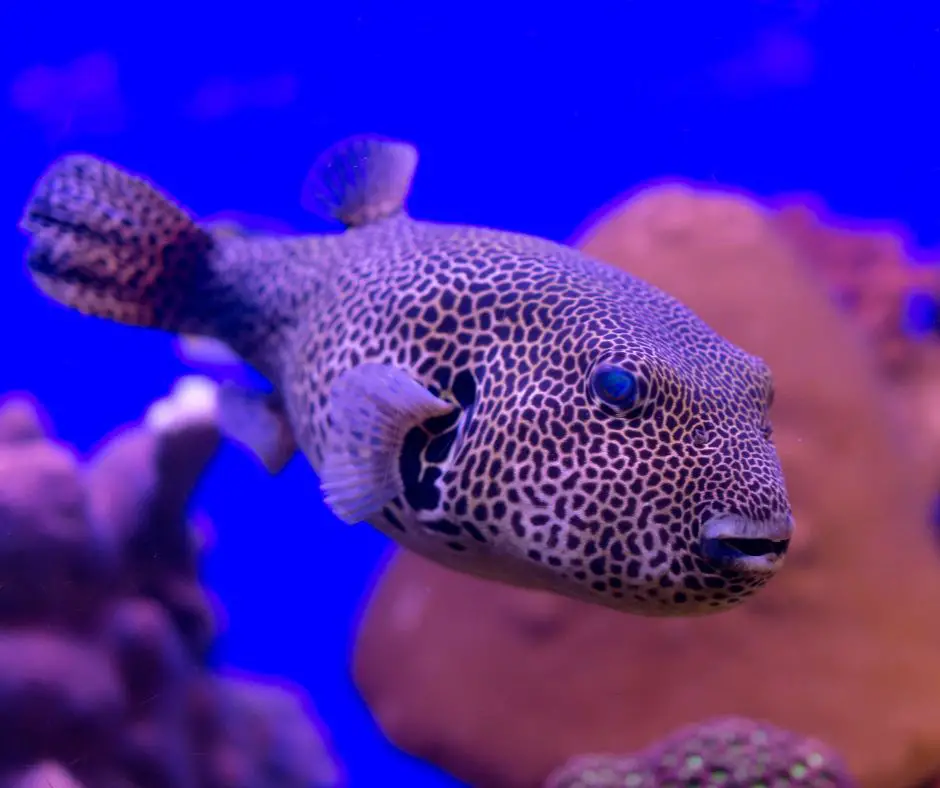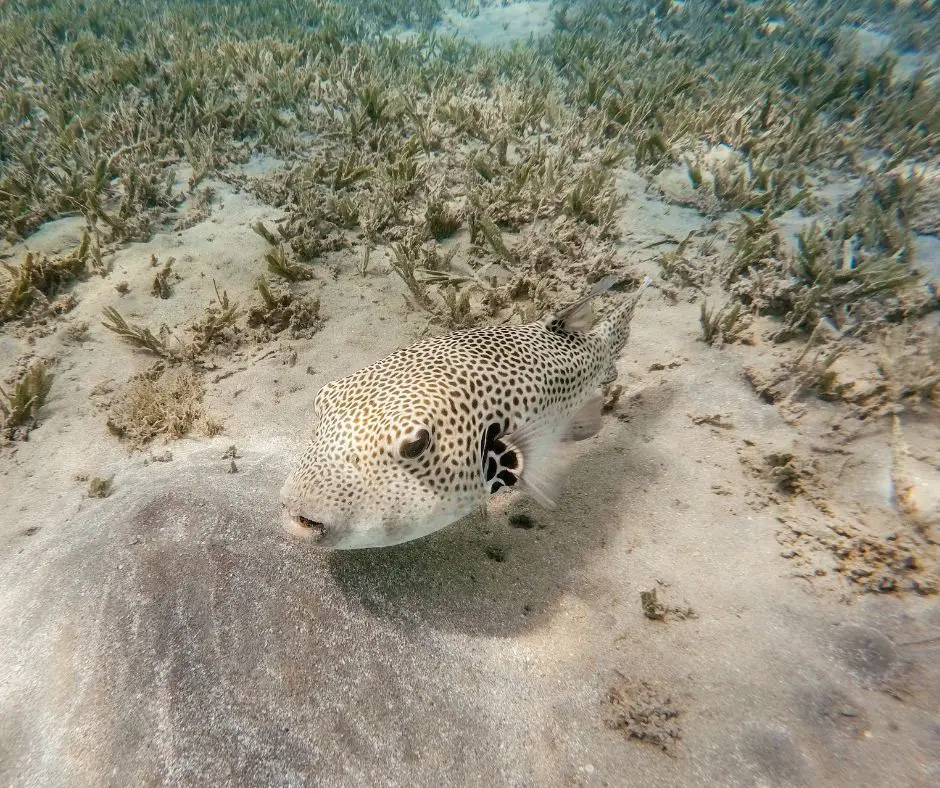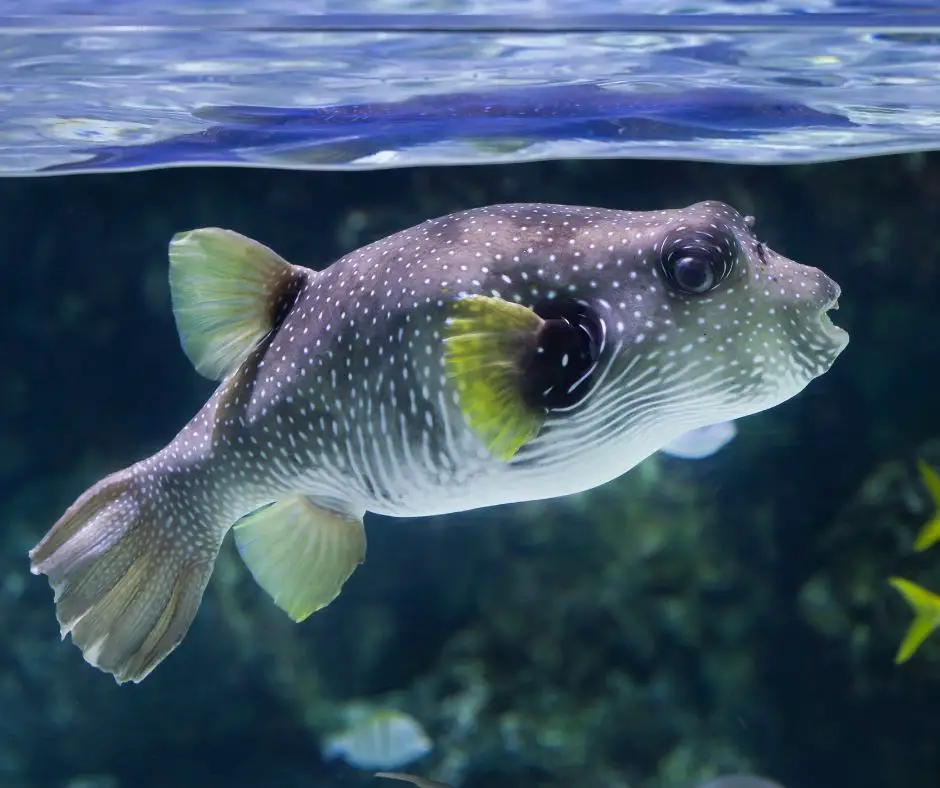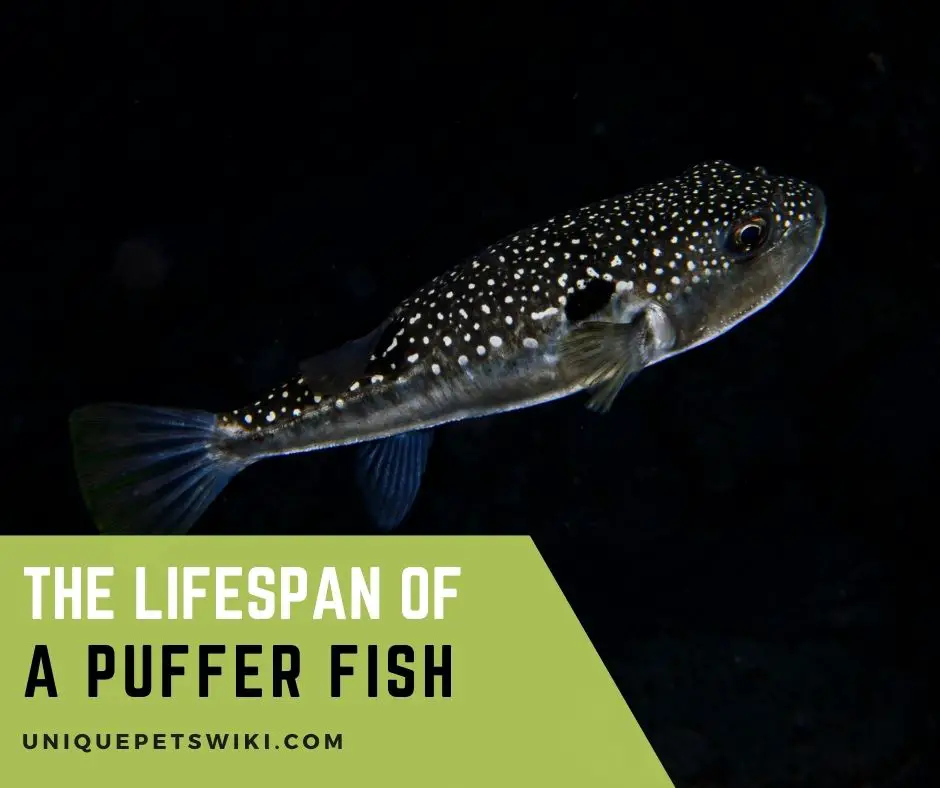Whether you are the owner of a puffer fish or considering getting one, it is a good idea to know all you can about the lifespan of a puffer fish.
After all; this knowledge can help you take better care of your pet and may even help it live longer.
In this guide, we will discuss the lifespan of a puffer fish as well as tips on keeping a pufferfish as a pet.
Contents
Can You Keep a Puffer Fish as a Pet?
Yes, you can keep pufferfish as pets. However, taking care of pufferfish is not easy since they have unique requirements.
Pufferfish only make good pets for someone who is highly experienced in keeping these delicate fish as pets.
Potential puffer fish owners need to do careful research before keeping one as a pet because these are no ordinary fish.

Legal issues
Many countries are known to ban the sale of pufferfish for recreational and commercial purposes. They are also banned as food in most US restaurants.
So, before you buy a puffer fish, please do your research about local legal requirements. You might even need a special license if you plan to keep a puffer as a pet or breed it.
Behavior
The spikes of puffer fish are known to carry a deadly toxin called tetrodotoxin. This toxin is 1200 times more poisonous than cyanide. If the puffer fish bites you or its spike cuts into your skin, you could become sick.
They display the unique behavior of puffing up when scared or threatened. This can stress their bodies and many even die after they puff up.
Puffers also do not have scales like other fish. Instead, they have a slimy layer with spikes on their backside.
This delicate slimy layer can get disturbed if you touch it making the fish susceptible to bacterial infections.
Special diets
Pufferfish are rather unique in terms of behavior, diet. They need high-quality foods with shells such as crabs, shrimp, live snails, etc.
This is because they have sharp teeth or beaks that grow continuously. To keep their teeth toned down, they need these hard shell foods.
Finding human-grade shell food can be expensive. But, without this diet, your pet won’t thrive. Its teeth could also cut into its tender mouth causing injuries that may need medical attention from an aquatic veterinarian.
How Long Do Puffer Fish Live in Captivity?
The average lifespan of puffer fish is about 10 years. This is applicable to captive or pet pufferfish. Wild pufferfish tend to live a lot longer.
Pet pufferfish have stringent dietary and other needs, which is why they do not make good pets for novice fish keepers.
No one knows for sure how long puffers live in the wild. But, it is quite likely that they may live longer than 10 years in their natural environment.
If you plan to keep a puffer as a pet, you need to understand that 10 years is a long time and you need to be committed to taking care of it for the duration.

What are the Factors Affecting the Lifespan of a Puffer Fish?
There are different actors affecting the life of pufferfish in captivity and in the wild since both environments are significantly different.
In the wild
Polluted oceans, loss of habitat, and overfishing are the main culprits causing a decline in puffer fish numbers.
- Oceanic pollution reduces the natural food of puffer fish. Escalating chemical levels in the sea are threatening the aquatic food chains and there is no doubt that the pufferfish is also affected.
- In many Asian countries, puffers are a delicacy. Japan alone eats 10,000 tons of puffer fish each year. In China too, pufferfish are being eaten into extinction.
In captivity
Improper handling, bad diet, and a general lack of knowledge can impact a puffer fish’s lifespan in an aquarium.
Improper handling
- Touching the fish causes them to swell up which is stressful for them.
- It could disturb the natural slime on their skin making them susceptible to bacterial diseases, ich, etc.
Improper diet
- As mentioned before, puffers need human-grade hard-shell diets. Without it, their teeth continue to grow and your pet may end up with oral infections.
- Without a proper diet, your pet will not thrive.
Improper breeding
- Many novice breeders breed their puffers indiscriminately with the view of selling the offspring to make money. This can cause disease and death. The resulting fish spawn is not healthy and also prone to diseases.
Improper housing conditions
- Puffers need proper water parameters like temperature, ammonia, nitrites, and nitrates. They also need specially conditioned water having optimum pH.
- Without these conditions, they could get sick and even die.
- Often, people house puffer fish with other tank mates. This could stress out these delicate fish as they may feel threatened by them.
How Old is the Oldest Pufferfish?
If you go to certain forums, you might find pufferfish owners claiming their pets to be over 10 years old. There is one YouTuber who claims to have a 16-year-old puffer fish. (Fast-forward the video to about 4:25 to see it!).
Sometimes pet owners cannot say for sure how old their puffer fish actually is. This is especially true if they have bought their puffer from an aquatic pet shop or an online store.
After all; the storekeeper may not have accurate information about the fish’s age. Only if you have raised your puffer right from its birth, can you tell its age for sure.
Are Puffer Fish Endangered?
Since puffer fish are toxic creatures, they are not endangered. Most populations of pufferfish are stable.
However, certain species are vulnerable. Pollution, overfishing, and habitat loss are the factors affecting the puffer fish population.
According to The Puffer Fish by Alicia Z. Klepeis, species like the Tetraodon Pustulatus which is only found in the Cross River in Nigeria and Cameroon, are threatened due to habitat loss.
Scientists worry that oil exploration in the region is harming this species.
Similarly, the Chinese Pufferfish has been marked by the IUCN (International Union for Conservation of Nature) as critically endangered.
Its population has declined by almost 99.9% over the past few years thanks to its being one of the 4 varieties of pufferfish/fugu consumed as sashimi in massive amounts in Japan.
Tips to Increase PufferFish Lifespan
You can take several steps to increase your puffer fish’s lifespan. These include selecting a hardy and healthy puffer, setting up the right environment for it, and providing it with the best of care.

Tips to Select a Healthy Pufferfish
- Buy your puffer fish from a reputed breeder. Get recommendations from an aquatic vet or from fellow pufferfish owners regarding good breeders. Online forums are also good places to start your search for good pufferfish breeders.
- If you opt to buy your puffer from a shop, ask several questions to the store-keeper. If they cannot answer your questions regarding its care, steer clear of such a shop.
- Healthy pufferfish cost between $50 and $75. If a store or breeder is selling one for less than this price, then it is a red flag.
- Observe the fish carefully before buying. Its skin should be healthy. There should be no signs of ich on it. Ich is characterized by white spots all over the pufferfish’s body.
- Your pet should appear happy, active, and swimming around gleefully. It should also appear round, alert, and bright, and not show signs of malnourishment or ill-health.
Setup an Ideal Tank
Once you get your fish home, invest in a good tank setup. A good tank for puffer fish has the following features:
- For a small puffer, the tank should be at least 20-30 gallons in size. For a large pufferfish, the tank should be around 100 gallons.
- Most freshwater puffers need a pH of 7.0-7.6 and a water temperature between 74 and 78 F. Saltwater puffers may require aquarium salt added to their water.
- All other water parameters like water hardness and currents will depend on the exact species of puffer fish. Make sure you research your particular species well and set up the tank accordingly.
Irrespective of the species you own, make sure to test the water regularly. You must also clean the tank from time to time.
API FRESHWATER MASTER TEST KIT 800-Test Freshwater Aquarium Water
- Contains one (1) API FRESHWATER MASTER TEST KIT 800-Test Freshwater Aquarium Water Master Test Kit, including 7 bottles of testing solutions, 1 color card and 4 glass tubes with cap
- Helps monitor water quality and prevent invisible water problems that can be harmful to fish and cause fish loss
- Accurately monitors 5 most vital water parameters levels in freshwater aquariums: pH, high range pH, ammonia, nitrite, nitrate
- Designed for use in freshwater aquariums only
- Use for weekly monitoring and when water or fish problems appear
Last update on 2022-12-30 / Affiliate links / Images from Amazon Product Advertising API
Provide it with Proper Care
Once your puffer fish has settled down, you need to provide it with regular care and maintenance.
- Feed your puffer based on its species. Most puffers need a diet of shell animals like slugs, snails, shrimp, etc. to keep their teeth healthy.
- For the reasons explained above, please avoid touching your puffer fish and instruct children about the same. Never pop an inflated puffer fish- it could die.
- Do not bring your puffer out of the water for prolonged periods of time.
Puffer Fish as Pets. Freshwater Puffer Fish Facts
- Lang, Elliott (Author)
- English (Publication Language)
- 138 Pages - 03/05/2013 (Publication Date) - IMB Publishing (Publisher)
Last update on 2022-12-29 / Affiliate links / Images from Amazon Product Advertising API
Educate Yourself About Pufferfish Diseases and Remedies
Stay up to date with the latest knowledge about the particular species of pufferfish you own.
- Monitor your fish from time to time.
- Watch out for any abnormal behavior. If you see signs of illness, please contact an aquatic vet right away.
Remember: many minor diseases in pufferfish can be controlled and treated with prompt medical treatment.
Wrapping Up – The Lifespan of A Puffer Fish
The lifespan of a well-cared-for puffer fish is around 10 years in captivity. Some people claim their pet puffers are older than 15 years of age.
In the wild, its lifespan is longer. However, many wild puffers fall prey to predators like tiger sharks. Also, factors like overfishing, habitat loss, and pollution are reducing pufferfish populations.
We hope this guide helps you take good care of your pet puffer fish.


